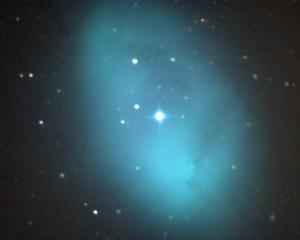
I was born in England in 1966. Thanks to Dr Google, my research shows that in England, when I was born, the average life expectancy for a man was 68.5 years.
That means, all things being equal, I may have just about ten years of heartbeats remaining.

There's a relatively bright comet visible in the western sky after sunset. The comet is called Pons-Brooks, which, as I explained in a previous column, is named after the astronomers who first saw it in 1812 and 1883, respectively. The comet's orbital period is 71.32 years, which is (roughly) halfway between mine and Gus' life expectancy.
I was excited to view the comet and desperate to have some company on the expedition to see it. Last Sunday, I asked Gus to accompany me on a road trip.
I wanted to photograph a comet that neither he nor I would be around to see when it next appeared. That was my pitch for the journey. He agreed to come along despite grumbling about work pressure (do lawyers work?). After packing various telescopes and cameras into the car, we set off to my favourite dark sky location near Clarks Junction.
During our hour-long commute from Portobello to the heights of Strath-Taieri, we chatted about life, the universe, and everything. We set up the telescopes upon arrival and waited for the sky to darken. It was a magnificently calm and cloudless night, and despite his dispassionate lawyerly training, even Gus got just as excited as me about the glorious starry dome above us.
We found the comet and snapped away as it slowly descended in the western sky.
While Gus and I will never see the comet again, our shared memories of a night chasing it will live as long as we do.
Vale Comet Pons-Brooks.










